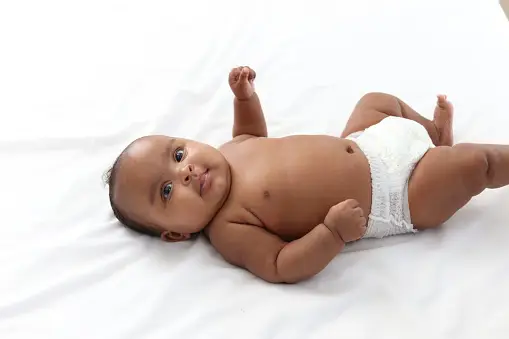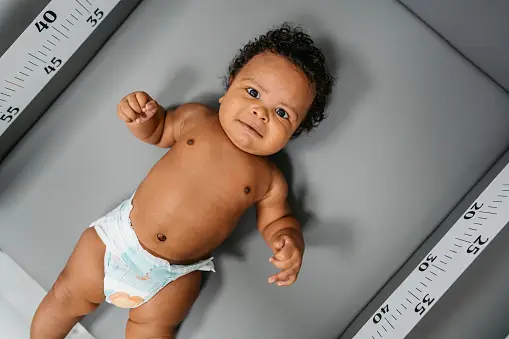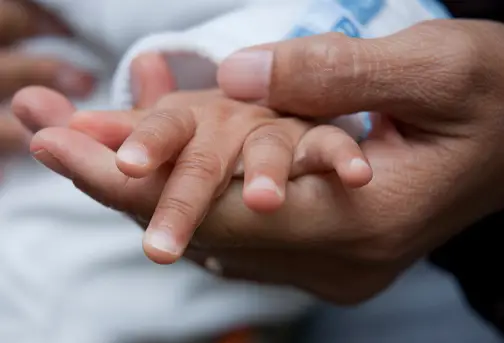When you cut your baby's umbilical cord after delivery, a stump is left behind. This stump eventually dries up and falls off, leaving behind the baby's navel.
A baby's navel is the umbilical cord remnant that connects them to their mother during pregnancy. This stump is the baby's navel or belly button. The baby's navel changes in size during the first few months as it heals and dries out. However, keeping the area clean and dry is important to prevent infection.
Why is my baby’s navel big?
In the weeks after birth, it is normal for your baby's navel to be big; swelling and inflammation are normal parts of the healing process. Also, it is not abnormal for your baby’s skin to appear loose and saggy, especially around the navel. The umbilical cord stump can appear large. This may naturally shrink or dry out as your baby advances in age.
Again, the size of the navel is sometimes determined by your genetics, as well as the size and shape of its umbilical cord. Some babies are born with a more prominent navel than others, which is normal.
The big navel can also result from an umbilical hernia, which develops when your baby’s stomach muscles do not close tightly over the opening, and part of the small intestine slides out through it, causing a soft bulge of tissue around or in the navel.
How can I make my baby’s navel smaller?
There is no proven way to make your baby’s navel smaller. The best thing you can do is to keep it clean and dry. As your baby grows and develops, their body proportions will change, including the size of their navel. Most navels look smaller, flat, or almost unnoticeable as babies age.
Your primary concern should be your baby's overall health. If the navel poses no threat, leaving it to shrink or retain its size is best.
Is it normal for my baby to have a big stomach?
It is not unusual for your baby's stomach to appear rounded or protrude, especially after eating. This may be due to accumulated gas or bloating from feeding.
A distended belly only becomes an issue for concern if it has a swollen and hard outlook and also if your baby vomits and experiences difficulty in stooling.
Can I use hot water to press my baby’s big navel?
It is widespread that massaging a baby's navel with hot water can cause the navel to shrink. Some mothers believe that hot water massage can reduce swelling and inflammation in the area, leading to a smaller navel, while others believe that hot water helps speed up drying and healing.
The size of a baby's navel can change as they grow. However, this has nothing to do with hot water or massage. There’s no proof to support the claim that the heat from the hot water or massage can have any significant effect on your baby’s navel. Experts say that using hot water to massage a baby's navel can be dangerous, as it can cause burns or skin irritation.
How to care for your newborn’s navel
The best way to care for a baby's navel is to keep the area clean and dry and to let it heal naturally. This will ensure that the baby's navel heals properly. This can be achieved by:
- Wash the area with warm water and mild soap at bath time.
- Endeavour to pat dry with a soft towel afterward.
- Do not put creams, ointments, or oils on the umbilical cord stump to avoid clogging the pores, slowing down the healing process, or infecting the navel.
- Avoid scrubbing the area as it can cause damage to the delicate skin.
- Keep the umbilical cord dry and exposed to air. Exposure to air helps it dry and fall off naturally.
- Always check for any sign of infection.
Some people believe that massaging a baby's navel with hot water can make it smaller. However, the heat from hot water is insufficient to cause any significant change in the skin. Massaging a baby's navel is not recommended, as it could cause irritation or damage to the skin. It is best to let the navel heal naturally and avoid touching it.
Frequently Asked Questions (FAQs)
Can I use spirit to clean my baby’s navel?
It is not advisable to use any kind of alcohol-based product, such as spirit, to clean your baby's navel. This can irritate the skin. Just warm water and mild soap is enough.
Will my baby’s navel reduce?
Most baby's navels shrink in size as they age, but because every baby is born different, some do not experience a significant reduction. Your baby's navel may not shrink as quickly or as much as other babies.










Comments